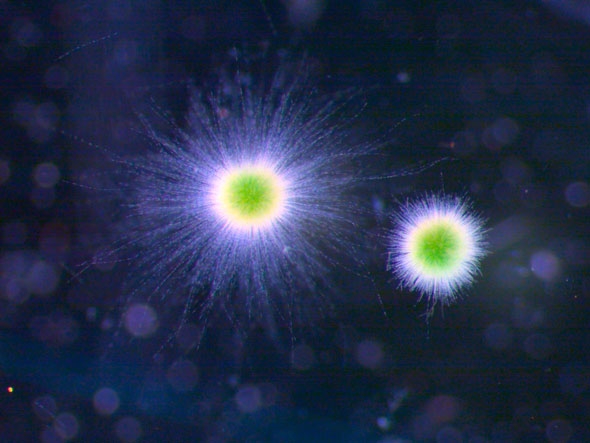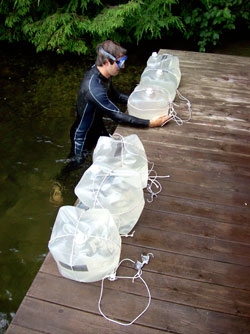Sam Fey, a graduate student in the Ecology and Evolutionary Biology (EEB) program, has been awarded the Journal of Plankton Research’s 2010 David Cushing Prize for his paper “Zooplankton Grazing of Gloeotrichia echinulata and Associated Life History Consequences.” The annual prize, given to a career scientist aged 35 or younger, honors the best paper published in the journal the previous year.

The colonial cyanobacterium, Gloeotrichia echinulata, the focal species of Fey’s research. (Courtesy of Sam Fey)
“I was honored and humbled to receive this award,” says Fey, who is also an IGERT (Integrative Graduate Education and Research Traineeship) Fellow in Polar Environmental Change at Dartmouth. “My collaborators—Professor Kathy Cottingham, Zach Mayer ’08, and Stacy Davis, a research technician —and I put a lot of work into this project, and it was encouraging that our research was acknowledged in this way.”
Cottingham, who is an associate professor of biological sciences and Fey’s advisor, says the paper’s co-authorship “demonstrates the strength of cooperation among scientists at different stages in their careers.” That sort of teamwork is common at Dartmouth, she notes.

Sam Fey collected water samples in oligotrophic and mesotrophic lakes located in northern New England. (photo by Ellen Irwin ’14)
Through field and laboratory studies, Fey’s team discovered strong evidence that crustacean zooplankton graze the colonial cyanobacterium, Gloeotrichia echinulata. The research recognized G. echinulata as a potential maintenance food for zooplankton. It was previously thought that this species was likely to be inedible to most zooplankton.
“Watershed development and climate change are both predicted to increase the severity, frequency, and abundance of cyanobacteria blooms in the future,” says Fey. “We believe that understanding the interaction between cyanobacteria and their potential consumers is an important field of research.”

